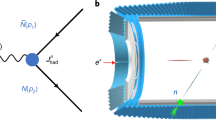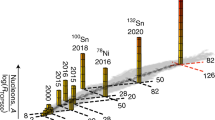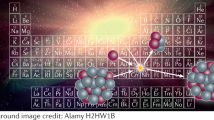Abstract
THE word ‘neutron’ has been attributed to Rutherford by Glasson1 and to W. D. Harkins2 by Glasstone3. It appears likely that it was not used by either Rutherford or Hawkins before about 1920. In both cases, the neutron was a hypothetical combination of a hydrogen nucleus (also called a ‘positive electron’ or ‘proton’) and an ordinary negative electron.
This is a preview of subscription content, access via your institution
Access options
Subscribe to this journal
Receive 51 print issues and online access
$199.00 per year
only $3.90 per issue
Buy this article
- Purchase on Springer Link
- Instant access to full article PDF
Prices may be subject to local taxes which are calculated during checkout
Similar content being viewed by others
References
Glasson, J. L., Phil. Mag., 6, 42, 597 (1921).
Harkins, W. D., Phil. Mag., 6, 42, 305 (1921).
Glasstone, S., Sourcebook on Atomic Energy, 56 (Van Nostrand, New York, 1950).
Sutherland, W., Phil. Mag., 6 3, 162 (1902).
Author information
Authors and Affiliations
Rights and permissions
About this article
Cite this article
BRUSH, S. Origin of the Word ‘Neutron’. Nature 190, 251–252 (1961). https://doi.org/10.1038/190251b0
Issue Date:
DOI: https://doi.org/10.1038/190251b0
This article is cited by
-
A terminological history of early elementary particle physics
Archive for History of Exact Sciences (2023)
Comments
By submitting a comment you agree to abide by our Terms and Community Guidelines. If you find something abusive or that does not comply with our terms or guidelines please flag it as inappropriate.



